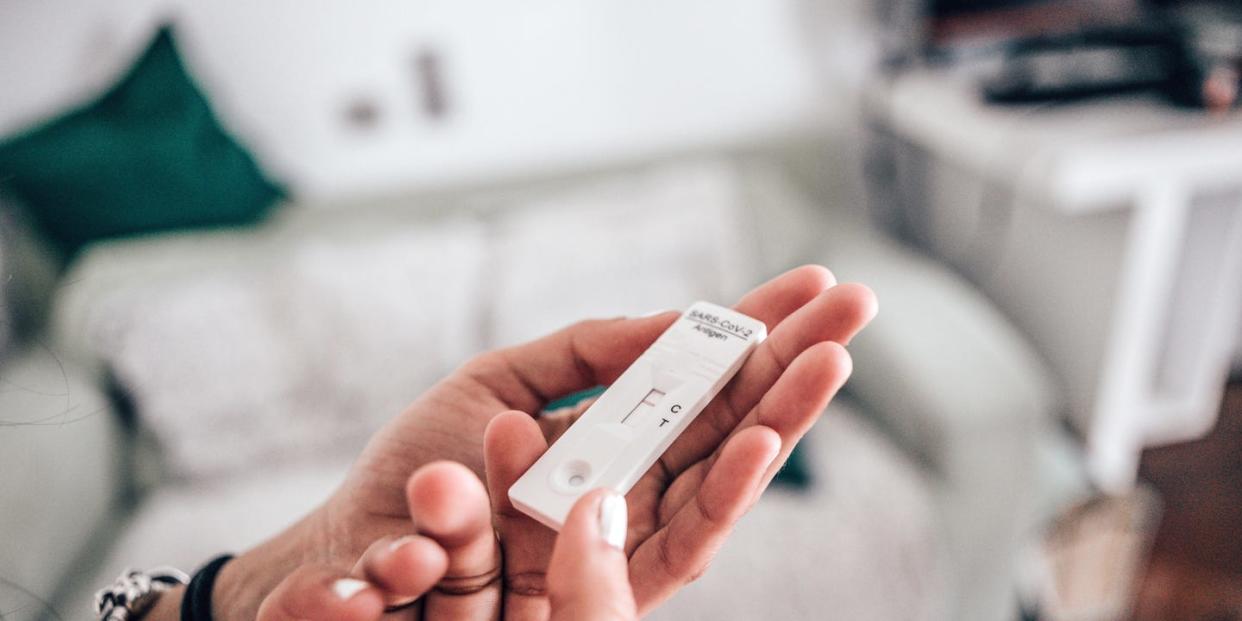How Often Can You Get COVID-19? Experts Say Reinfection Is More Common Than You Think

- Oops!Something went wrong.Please try again later.
Earlier in the pandemic, it was easy to assume that, once you got COVID-19, you were immune from getting it again—or, at least, protected for a while. But reinfections became increasingly common as the pandemic wore on and it’s now not uncommon to hear of someone getting COVID twice—or more.
Unfortunately, reinfections can happen after you’ve been vaccinated against COVID-19, too. All of that raises a huge question: How many times can you get COVID? And, with that, how often can you get COVID?
Experts point out that we’re still only two years into this pandemic. And, with that, health experts are still figuring a lot of this out. “We’re still learning,” says Thomas Russo, M.D., professor and chief of infectious disease at the University at Buffalo in New York. Still, there are some things doctors know about COVID reinfections at this point. Here’s a breakdown.
So, how many times can you get COVID-19?
There’s no hard and fast answer here and, unfortunately, there doesn’t seem to be a limit on how many times you can get COVID-19. “Based on experience with other coronaviruses that are endemic, people will get COVID multiple times during their lives,” says Amesh A. Adalja, MD, a senior scholar at the Johns Hopkins Center for Health Security.
A recent study published in the journal Science analyzed epidemiological surveillance data in South Africa and found that reinfections of SARS-CoV-2 (the virus that causes COVID-19) seem to be more common with the Omicron wave. Among the 2.9 million people with a lab-confirmed case of COVID-19, there were 105,323 suspected reinfections.
The researchers also included this note: “Individuals with identified reinfections since November 1, 2021 had experienced primary infections in all three prior waves, and an increase in third infections has been detected since mid-November 2021. Many individuals experiencing third infections had second infections during the third (Delta) wave that ended in September 2021, strongly suggesting that these infections resulted from immune evasion rather than waning immunity.” Meaning, even when these people had immunity from a previous infection, they were still vulnerable to a new COVID infection with a different variant.
As for how many times you can get infected, “the answer is ‘we don’t know,’” Dr. Russo says. “More than once is clearly the answer,” he adds.
The big issue is variants, Dr. Russo says. While a previous infection can provide some level of protection against future variants, it doesn’t seem to completely get rid of your risk of getting reinfected. “If you were infected with an earlier variant, they’re quite imperfect in protecting against Omicron,” he says. “And even with Omicron, you have BA.1, BA.2, and BA.2.12.1 to think about.”
How often can you get COVID-19?
Public health experts used to think that, once you got COVID, you were protected from another infection for at least three months. But that’s not really the case anymore, Dr. Russo says.
“We thought you were good for three months in terms of waning immunity but we’ve learned that the variant is critical as well,” he says. “People who might have gotten Delta are at risk of Omicron. The same is playing out with people who got BA.1 over the holidays—BA.2 and BA.2.12.1 shows up and they’re getting infected with those variants.”
In general, Dr. Adalja says, reinfections “will usually be separated by several months to a year.” But, he adds, “With a virus like SARS-CoV-2, and the current vaccine technologies, I think that reinfections are unavoidable.”
How to protect yourself from a COVID-19 reinfection
The ways of protecting yourself from a COVID reinfection are similar to how you’d protect yourself from a first COVID infection, Dr. Russo says. “Get vaxxed to the max and, when there’s high community burden of disease, avoid risky situations and wear a mask,” he says. “Our vaccines are imperfect against preventing infections, but that is your best strategy.” (See our guide to the best N95 and KN95 masks).
Dr. Russo cautions against relying on immunity from a previous infection. “If you’ve been infected previously, your best protection is packaging that with vaccination,” he says. “You shouldn’t feel like, ‘I’ve had COVID, this is behind me and it’s all good.’ That’s just not the reality.”
This article is accurate as of press time. However, as the COVID-19 pandemic rapidly evolves and the scientific community’s understanding of the novel coronavirus develops, some of the information may have changed since it was last updated. While we aim to keep all of our stories up to date, please visit online resources provided by the CDC, WHO, and your local public health department to stay informed on the latest news. Always talk to your doctor for professional medical advice.
You Might Also Like

